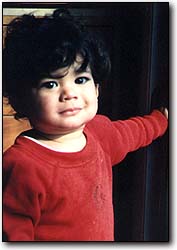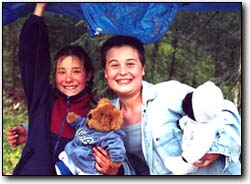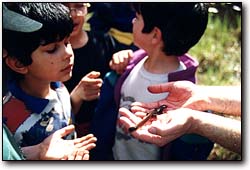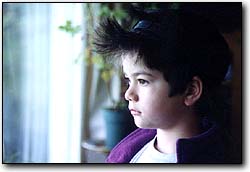
"I didn't want my children to be treated the way I treated some kids," the teacher volunteered apologetically. It's not that she was mean or uncaring, but in order to run a class with so many children, she had no choice but to engage in some form of manipulation, however subtle and well-intentioned it was. Maureen's children have never been to school: they homeschool.
We all love our children. From pregnancy and birth onwards we fuss over their health and well being. We educate ourselves on how to breastfeed and nourish them, how to meet their emotional needs and how to improve their chances of being intelligent and well rounded human beings. We give them toys to stimulate their intellect and we engage them in art and music. We send them to school, agonizing over their first day and how it will be for them. We know that it is a big day and we prepare by meeting the teachers in whose hands we will leave them on a daily basis for the next 12 years. We trust that all in all, notwithstanding the trials they must go through, we're doing the right thing. The teachers are qualified professionals, and will teach them the skills they need in our world. They are parents too, and appreciate the benefits of schooling, right?
Not necessarily. Some teachers prefer that their children don't go to school. They want them to learn at home. Why would a trained professional, an educator, decline for their own kids that which they are giving to others' children every day? The answers are surprising. Most of us have heard of homeschooling and of parents who choose this unconventional path. But wouldn't it be hypocritical for a teacher to be a homeschooler? It is surprising to know there is a higher percentage of teachers amongst homeschooling parents than there are teachers in the population at large. I talked with three such parents. One is a former teacher, one is a working teacher and the last one a former university professor.
To support her family Maureen takes care of small children in her Port Alberni home and also tutors school-going children occasionally. "Most homework is stupid, boring and an awful waste of time", she says. The children ask her: "Why do I have to do this?", so she has to answer as honestly as she can that "Other people think that you will get certain skills if you do this". Most of the time, the tutor and pupils have a good one-to-one chat and the kids do much better, not because of the tutoring but because of that special attention they receive. When she was teaching, she often spent many extra hours after school with children that simply needed someone with whom they could have a chat. Maureen recognizes that many children with poor or non-existent family lives are better off in school, as that is their only experience of order and sanity.
Maureen's children happily pursue their own interests in a form of homeschooling loosely known as "unschooling". They are free to go to school any time they want, but they have shown no interest. She is happy about that because they spend so much fun time together, and they are very close to each other. They're free from the pressure to conform to someone else's schedule and behaviour. "The pressure to conform is very subtle, but it is enormous", she emphasizes. You get to know very quickly if you're wearing the wrong sneakers. Girls learn very quickly how to be "good little women" and strive above all to please their teachers.
When his wife first brought up the idea of homeschooling, David was completely opposed to it, thinking "How can I do my job well as a teacher, if my own daughter is homeschooling?" He himself had had a wonderful school experience in the interior of British Columbia. He had enjoyed great marks and really liked his teachers. They were local people who had returned to their communities after getting their certificates in the city. He knew from the age of 16 that he was passionate about becoming a teacher, so he took a 4 year degree from UBC in Phys. Ed. and another 1 year POD degree in Castlegar. He started teaching the year his first child was born. He was in constant disagreement with his wife about their children's education, until he started to notice things in his place of work.
David was teaching math to lower end streams in grades 9 to 11, and came to the conclusion that elementary schools were not doing a good job of giving the kids a complete math education. He doesn't blame any specific teacher or school. The system is structured so that no one can fail math in elementary school if they are well adjusted and doing well in other subjects; they may graduate from year to year without learning the math skills for that year, with the hope that they will catch on sooner or later. But in his experience, many in Grade 9 cannot do long division or other basic arithmetic. So he found himself trying to fill in their gaps, as well as teach them the regular curriculum.
"Grades 11 and 12 are the only grades that count finally. I want my children to get a firm foundation early so that they can do well in those final years." he continues. They plan to send their kids to high school. Therefore, as a couple, David and his wife teach their kids these basic skills at home. At first David started with a fairly structured approach, but found that they could learn just as well if he followed their interests. They often play Monopoly and The Farmer Game, and while they're having lots of fun, the kids are learning arithmetic and reading. In his opinion, good math skills are the building blocks for good critical thinking skills.
David laments the lack of play time in elementary school. He stresses that children need time to play. In high school he notices that the students don't know how to play with each other and have fun. If they do not have a computer game or other ready-made activity, they are "bored" and everything, including physical education, becomes a chore. His six year old often asks him high school level questions that he knows the teachers would never have time to answer. He adds that families need to spend more time together, just doing simple things and having fun, allowing for creativity to thrive.
Francine saw it as a class problem, and not a teacher problem. She discussed the idea of homeschooling and was supported by teachers and the principal. They maintained access to the school library and enjoyed good relations with the school. Her younger child Christopher was in Grade 1 at the time and she spent most of every day volunteering in his classroom. The teacher was very stressed out trying to control disruptive kids and had little time for teaching. Francine's job was to keep the rest of the class occupied while the teacher dealt with the high need children. Rather than juggle one child in school, one at home and continue the volunteering, it was far more practical to simply have both the children at home.
Richard and Christopher immediately enjoyed homeschooling. Richard in particular was thrilled to do his entire day's school work in 2-3 hours instead of the 6 hours plus homework he was doing in school. It was pleasurable work, with no lectures on behaviour. The teaching was not in top-down format; rather it was a shared learning experience. Richard was feeling better physically; it was restful at home in contrast to the noisy classrooms and cafeteria with their poor ventilation and large crowds of people. Their family enrolled in NIDES, North Island Distance Education School, and found them to be quite flexible with the material.
"I don't know if my teaching experience helps, as I've never not been a teacher, but I think perhaps it helps," she speculates. "However, I don't think it's necessary to be a teacher. It does help to be literate, but I know of instances where the parents have learned along with the kids, and that was beneficial to all." At first Francine was quite structured in her approach to home learning, as her background was in formal, rigid educational methods. In France, homeschooling was something in the realm of the twilight zone. At the beginning, there was a lot of anxiety and as a couple they continually discussed how to educate the children. They were glad to have correspondence courses. She learned with time to let go little by little. If it snowed, they would go outside and play and abandon school work. The family incorporated a morning walk or run before breakfast. They went together. There was a huge increase in the well being of the family and the stress level was reduced considerably. Learning became easier and the rules more mellow. The family was closer, more intimate.
The kids went back to school last year of their own choosing after five years of homeschooling. They are happy and well-adjusted, but do not find the work in school very challenging. They notice a lot of anti-social behaviour and are praised for their good manners. I asked Francine what would happen if they were unhappy in school. She replied that they would stay home in an instant.
Francine is passionate about education. In her opinion, school is mostly day care and most parents are more concerned about the time table and schedule than about the contents of the school day. School is so entrenched in our culture that most parents do not fully appreciate that there are alternatives. For their family, learning takes place all the time and everywhere, and school has no special magic with which to educate children. The school system repeats the mantra "We are the magic place where it happens, you people just don't know how." Then people send off their kids to this "magic place". But teachers, however sincere and hard-working, cannot accommodate all the learning styles and end up being burned out by the process. Kids quickly get labeled as "can't read", but Francine insists that many children are simply not ready to learn because of extenuating circumstances. She recalls one child in Grade 1 who was asthmatic and allergy sensitive; the child reeked of smoke, obviously in a smoking environment at home. She looked pale, tired, and unhealthy. What this child needed was rest, food and love, and only then could she be ready to learn.
Francine thinks school should not take all day; at most, it should take half a day. Children need time to play and time in which they have "nothing to do". She recommends switching off the TV and the computer. Kids need time to run, sing, play and day dream.
Teachers are not mean and they do care; they are passionate about education. They want the best for their students and their own children. With work experience, they know the limitations of the class room and school setting. In a very difficult decision, risking ostracism and labels of hypocrisy by their colleagues, they choose to have their children learn outside the public school system. The names and locations in this article have been changed to protect the careers and privacy of the individuals.
British Columbia enjoys the most favourable conditions in Canada for home learners.
|
English 315
Malaspina University-College
October 16, 2000


 Homeschoolers go on field trips in small groups
Homeschoolers go on field trips in small groups
 Children need lots of time to daydream
Children need lots of time to daydream